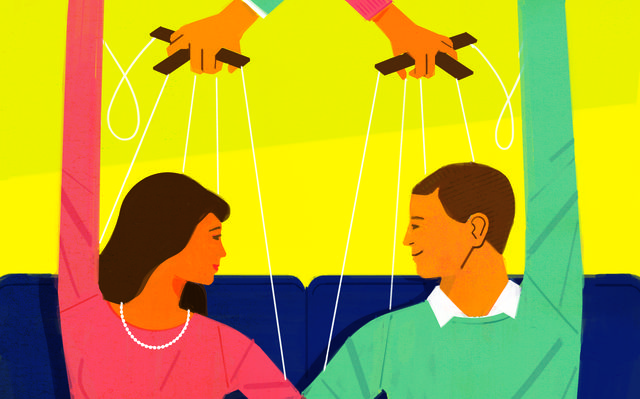Our first date almost didn’t result in a second date. When Adam opened the door, Allison couldn’t figure out why he was dressed like a teenager on his way to the gym. Then she found out he did magic tricks. Strike two.
In any relationship, there are deal-breakers. Smoking. Doing Crossfit. Chewing too loudly. But what about the things that are tolerable but still in serious need of improvement? There are times when you know what’s best for your partner. That requires you to master the art of persuasion. And some of the same techniques you use at work to win friends and influence people can come in handy at home too.
Allison managed to see past the wardrobe dysfunction and accept a second date. Soon she was hinting that Adam should throw out all his ratty conference t-shirts (why had no one told him this sooner?!?). He refused. So then she asked if he would please get rid of just one: the worst one. He agreed.
Psychologists call that the door-in-the-face: you make a big ask, it gets denied, and then you follow up with a smaller request. Adam felt guilty saying no twice in a row, and ditching one shirt seemed like a remarkably reasonable thing to do, compared to a whole closet full of them. And that yes became a foot in the door. Once Adam had agreed to dump one shirt, he felt silly holding onto a few others. Pretty soon he was running low on shirts. And then she was in.
Allison started buying new (better) shirts. After a couple years Adam’s entire wardrobe had been completely replaced. It was like the ship of Theseus, where you replace one plank at a time until you’ve swapped out every one of the original pieces. Is it the same ship? Adam definitely wasn’t the same shlub.
As Adam began to travel more for work (now in a matching ensemble), he started to realize that Allison needed a little away time of her own. No matter how much you love your spouse, spending time with friends contributes to happiness, and Adam encouraged her to go on a trip with friends. But Allison is a bit of a homebody and would consistently decline traveling without family. So Adam started making offhand comments about how a friend of ours goes away one weekend every month. Ten years later, Allison went on a two-day trip with two friends. Progress.
It’s called social proof. We follow the lead of similar others. It’s why infomercials have shifted from “operators are standing by, please call now” to “if the lines are busy, please try again.” If you might get a busy signal, it means a lot of people are making this unnecessary purchase. I need to get mine now! It’s why people are more likely to make an effort to save energy when they find out their neighbors are doing it. And it’s why you never considered spending your Sunday morning laying down between a garbage can and a rock on a park bench, but suddenly you got really, really into planking.
Social proof is most powerful when we’re uncertain about what to do: that’s when we pay attention to what others are doing. And we’re most likely to follow their lead when we feel we have something unique in common with them—or when we look up to them. So when you’re trying to get your partner to eat healthier and they’re hesitant to give up their 10 p.m. ice cream ritual, tell them someone they admire is a big fan of the new Keto Paleo Dumbo Cleanse.
Even without a handy friend to refer to, there are ways of choosing your words carefully to achieve what’s best for everybody. For instance: Adam is late. To everything. Always. He has a chronic inability to disengage from his current task before it’s done. And consistently underestimates how much time he needs to prepare for wherever he’s going. For years Allison tried to convince him to leave earlier. She tried “miscalculating” the starting time of events so his tardiness would land him on time. But he caught on. Eventually she decided to just ask him: “Will you be late today?”
That’s a really hard question to say yes to. Allison unwittingly set in motion what psychologists call self-persuasion. When someone makes a persuasive argument, we often put our defenses up and come up with our own reasons to disagree. But a question about our plans leads us to think about it. If the behavior is desirable, we’re more likely to come up with our own reasons to go along.
Just asking about intentions can be enough to change behavior: people are more likely to vote, volunteer, floss their teeth, and buy a new car after they’re simply asked if they plan to do it. And even if they initially say no, they’re still more likely to do it anyway. The question leads them to reflect—and some of them will end up deciding it’s a good idea to show up at the polls or clean their teeth. If you hate the way your partner drives, ask if they plan to get you home safely. And next time your spouse leaves dishes in the sink, try asking if they plan to invite an army of ants over for dinner again. Adam is proud to say he’s now on time at least once a week.
Then there are times when you know what’s best for you, but your partner doesn’t get it. You desperately want a Le Creuset 7-quart Dutch oven. You have your heart set on a Tipsy Elves unicorn jumpsuit. You’ve been dreaming of an NAD T770 with digital decoders and 70 watt amps and Burr-Brown DAC… but your wife just isn’t into it.
For his birthday one year, Adam wanted an air hockey table. The only thing Allison likes about hockey is having an ice cream sundae at the rink. In his quest to find a loophole, Adam had an idea. He told Allison about an awesome air hockey table that was about to be discontinued.
Scarcity. We want more of what’s less. It explains the sudden popularity of every soon-to-be-dust-collecting toy you’ve ever waited in line to buy at Christmas, like the Furby craze of the late nineties and the Cabbage Patch Doll hysteria of the early eighties. Which is why Allison gave in and bought the air hockey table. She didn’t want to be responsible for Adam missing out on the fun.
We want our partners to be happy. And they should want us to be happy too. So if your persuasive attempts fail, just follow these steps. One: buy the present you’ve been wanting. Two: hand it to your partner. Three: say “I got you this to give to me.”
Which is why Adam hasn’t picked out a present for Allison in about ten years.
In the wrong hands, these strategies could be manipulative. But when you actually want the best for the person you love, it’s not duplicitous. It’s one thing to change out a bunch of shirts or cajole your partner into planking. It’s a whole different thing to unfriend all of their high school buddies, make them take up Crossfit, and trick them into using their mother’s retirement savings to buy a once-in-a-lifetime timeshare in Jamaica. When you’re doing it because you’re sure you’ll both be happier, it’s not manipulation, it’s love. Which one you’re aiming for here is up to you.
Allison Sweet Grant is a writer and psychiatric nurse practitioner. Adam Grant is the host of WorkLife, a TED original podcast, and the bestselling author of Originals and Give and Take.













